Rotary International President for 2022-23, Jennifer Jones, wants Rotarians to imagine the possibilities in the change they can make to transform the world.

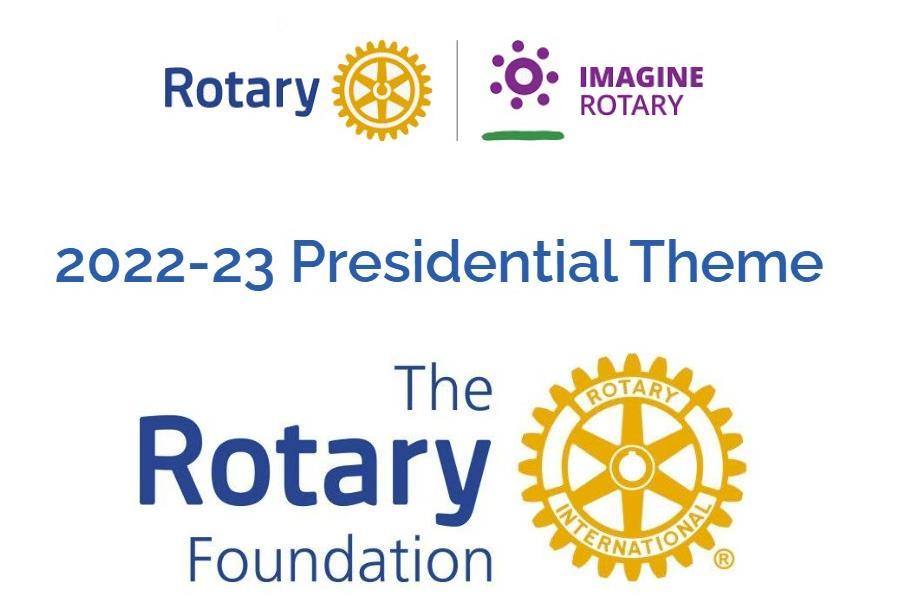


Rotary International President, Shekhar Mehta, India District 6330 Governor, Erin Shankie Club President, Joyce Nolin-Capman (2021-22)
Jones, a member of the Rotary Club of Windsor-Roseland, Ontario, Canada, urges us all to dream big and harness our connections and the power of Rotary to turn those dreams into reality.


February 2023 - D6330 , 2020 Page 1 An onehttps://issuu.com/ladykitt/docs/march_newsletter_2021
Imagine, a world that deserves our best, where we get up each day knowing that we can make a difference.”


February 2023 - D6330 , 2020 Page 2 TABLE OF CONTENTS Topic Page No.1 TRF TRUSTEE CHAIR’s February Message 3 FEBRUARY FOCUS – Peace & Conflict Prevention/Resolution 4 8000 Kilometres to Peace 5 PARTNERSHIPS 7 How Rotary Promotes Peace – Video 7 PEACE FELLOWSHIPS 8 KEEPING THE PEACE 9 PEACE FELLOWSHIPS – details 10 Masters Program 10 Professional Development Certificate program 11 FOUNDATION MOMENT 13 PEACE SCHOLARS SPEAK 14 D6330 GRANTS REPORT – Myrna Inglis 15 THANK YOU! 16 POLIO NOW 17 Our Goal 18 To succeed by 2023 19 2023 – a crucial year 20 Polio-free India – a long time coming 21 FROM D6330 – Put a Plus in your Life 22 PolioPlus Society Pledge form 23 PAUL HARRIS SOCIETY 24 ROTARY’S BEGINNING - continued 25 THE ROTARY FOUNDATION 26 Celebrating February 23 – World Understanding and Peace Day 27 How to observe February 23 – World Understanding and Peace Day 28 UKRAINE & ROTARY 29 ROTARY’S PRESIDENTIAL THEME FOR 2023-24 30 TRF -Ways to give 31 GRANTS & AREAS OF FOCUS 32 WHERE THE NEED IS GREATEST 33 COMING IN MARCH 33 ROTARY’S CORE VALUES 34 OBJECT OF ROTARY & FOUR-WAY TEST 35 EREY – Every Rotarian Every Year / Bequest Society 36 For the latest polio information, click here. Click here to make yourself smile!
1 Editor Kitty Bucsko
THE ROTARY FOUNDATION Trustee Chair's Message – FEBRUARY 2023
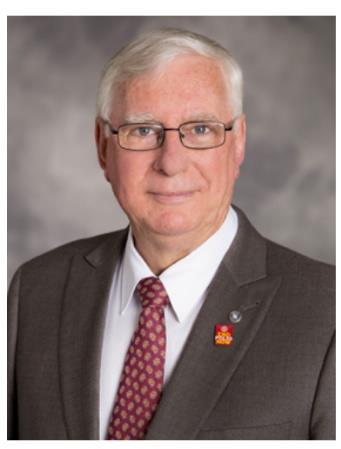
A GLOBAL FORCE FOR PEACE
One of the fascinating things about Rotary is that we are many things at once. We are a service organization based on action. We are also a professional and community networking group, not to mention a place to find friendship and fun.
And when you stop to think about it, you and I are also part of a peace organization. I saw this in 2013 when I represented Rotary at an international symposium on advancing a peaceful democratic transition for Myanmar. Despite recent setbacks, the fact that Rotary was at the table demonstrates that the world sees us as peacebuilders who are not deterred by the most difficult issues.
How did we earn this reputation? Through literacy projects that help people expand their minds and viewpoints. And through water, sanitation, and hygiene projects that create common ground for communities in conflict. The Rotary Action Group for Peace promotes hands-on service projects, and our annual international conventions unit thousands in celebration of global harmony.
Perhaps the most visible face of this cause is the Rotary Peace Centers program, ow in its 21st year. Today, more than 1,600 Rotary Peace Fellows are advancing the cause of peace in more than 140 countries. On February 1, we open applications for the next generation of peace fellows. Encourage your local peacebuilders to learn about Rotary and apply for this unique fellowship.
And soon, we’ll be recruiting fellows for a new peace centre in the Middle East and North Africa region as we begin working this year with a recently selected partner university. Made possible ty a generous gift of $15.5 million to The Rotary Foundation from the Otto and Fran Walter Foundation, the addition of this center furthers Rotary’s vision of peacemaking in action.
As we celebrate Rotary’s 118th anniversary and Peacebuilding and Conflict Prevention Month, we can be proud of the many ways Rotary promotes peace. Without The Rotary Foundation, and your support of it, none of that would be possible.
You can directly support this work through the Foundation by visiting rotary.org/donate and selecting the peacebuilding and conflict prevention area of focus. I also encourage you to contribute to the Ian and Juliet Riseley Endowed Fund in The Rotary Foundation to support peace projects.
If Paul Harris could see us now, he would be amazed by the astonishing growth of the little club he established in 1905 and the global force for good – and peace – that Rotary is today.
IAN H. S. RISELEY Foundation Trustee Chair
February 2023 - D6330 , 2020 Page 3
FEBRUARY FOCUS on PEACE AND CONFLICT PREVENTION / RESOLUTION through THE ROTARY FOUNDATION
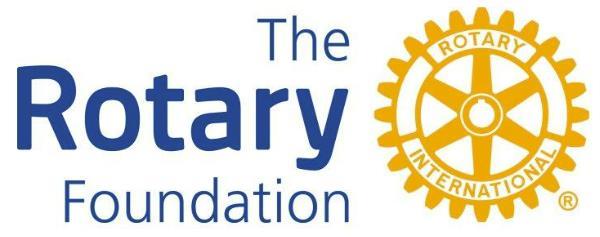
Peace and Conflict Prevention/Resolution
Today, over 70 million people are displaced as a result of conflict, violence, persecution, and human rights violations. Half of them are children.
We refuse to accept conflict as a way of life. Rotary projects provide training that fosters understanding and provides communities with the skills to resolve conflicts.
Rotary creates environments of peace
As a humanitarian organization, peace is a cornerstone of our mission. We believe when people work to create peace in their communities, that change can have a global effect.
By carrying out service projects and supporting peace fellowships and scholarships, our members take action to address the underlying causes of conflict, including poverty, discrimination, ethnic tension, lack of access to education, and unequal distribution of resources.
Our commitment to peacebuilding today answers new challenges: how we can make the greatest possible impact and how we can achieve our vision of lasting change. We are approaching the concept of peace with greater cohesion and inclusivity, broadening the scope of what we mean by peacebuilding, and finding more ways for people to get involved.
Rotary creates environments where peace can happen.
Rotary’s Four Roles in Promoting Peace
Rotary and its members are:
• Practitioners: Our work fighting disease, providing clean water and sanitation, improving the health of mothers and children, supporting education, and growing local economies directly builds the optimal conditions for peaceful societies.
• Educators: Our Rotary Peace Centers have trained over 1,300 peace fellows to become effective catalysts for peace through careers in government, education, and international organizations.
February 2023 - D6330 , 2020 Page 4
• Mediators: Our members have negotiated humanitarian ceasefires in areas of conflict to allow polio vaccinators to reach children who are at risk.
• Advocates: Our members have an integral role as respected, impartial participants during peace processes and in post-conflict reconstruction. We focus on creating communities and convening groups that are connected, inclusive, and resilient.
Click here to read more.

Click here to view a short video on Peace.
Rotary members in a small town of Nova Scotia, Canada, took action to bring two families from war-torn Syria to their country, where the refugees are starting a new life.
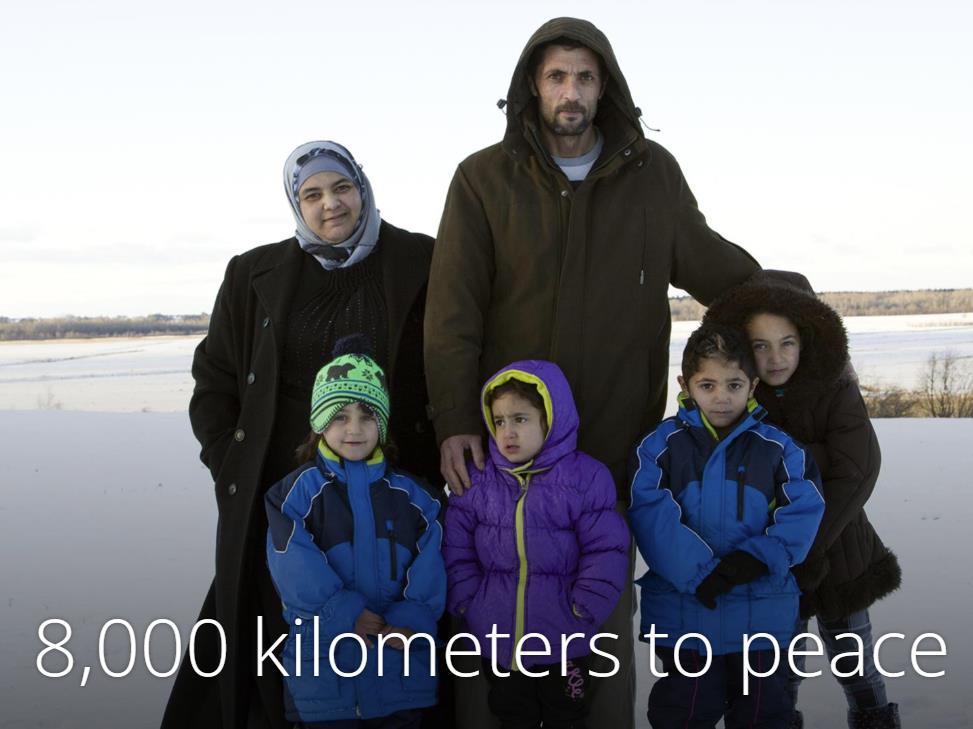 By Ryan Hyland Produced by Andrew Chudzinski
By Ryan Hyland Produced by Andrew Chudzinski
This explosion was close – much closer than the others that had rattled the village on the outskirts of Homs, Syria, where Sultanah Alchehade lived with her four young children. This one hit the school next door, blasting out one of the walls of their house.
Alchehade grabbed the children and ran into the night and the choking smoke and dust. A neighbor helped her carry her three-year-old twin boys, Mounzer and Kaiss; another drove the pickup truck they all clambered into. Over the next several days, as bombs continued to fall, the family – including daughters Kawthar, age six, and Roukia, a baby – took refuge in a nearby forest, sleeping under the trees as Sultanah tried to figure out their next move.
February 2023 - D6330 , 2020 Page 5
In neighboring Lebanon, Sultanah’s husband, Mazen, frantically tried to contact his wife. For years, Mazen had shuttled back and forth across the border every few weeks to do construction work on high-rise buildings in Beirut. While the jobs provided an income for his family, he says, the separation was hard. But their situation had just gotten much harder.
With the Syrian civil war now engulfing his village, Mazen couldn’t return. And it would be four months before his wife and children could cross into Lebanon.
Eventually, the family was reunited. They were alive. But they were refugees, seeking asylum in any country that would take them, hoping to get far away from the violence that had driven them, along with millions of other Syrians, into foreign lands.
The Alchehade family registered with the United Nations High Commissioner for Refugees (UNHCR), the agency responsible for resettling Syrian refugees, and waited. They were still in Lebanon nearly three years later.
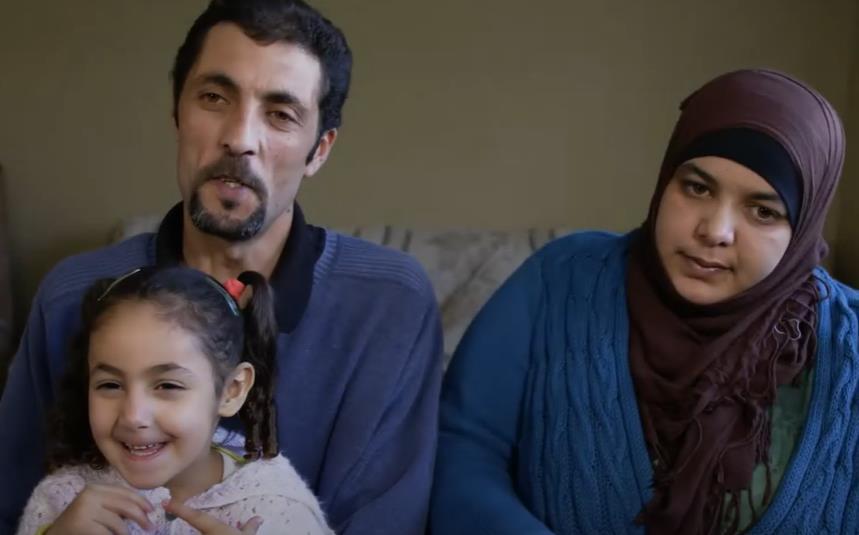
Meanwhile, 8,000 kilometers away, Rotarians in the small town of Amherst, Nova Scotia, were watching images of Syrian refugees on television and looking for ways to help.
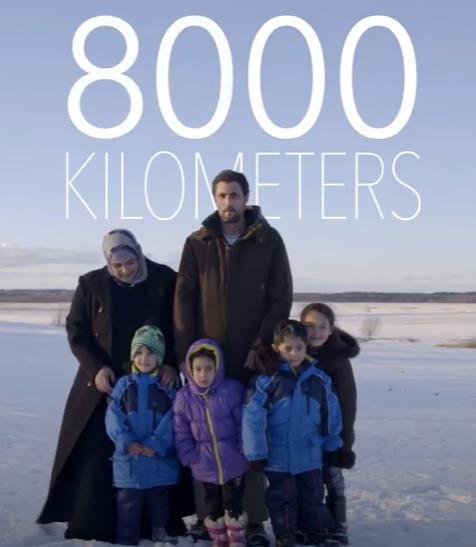
Click here to read the rest of this article.

• Click the photo below left to view the video of this Syrian family’s journey to Canada (Nova Scotia).
• Click the photo below right to view their story a little more about their journey.
February 2023 - D6330 , 2020 Page 6
PARTNERSHIPS WITH ROTARY
The Rotary Club of Amherst in Nova Scotia, Canada, partnered with two local churches, the First Baptist and Holy Family, to sponsor two Syrian refugee families. Club members used their experience and skills to help guide the initiative. Watch project leaders from all three organizations talk about how they achieved success.
Watch Rotary members talk about how to sponsor a refugee family.
Click here or the photo below to view the video.
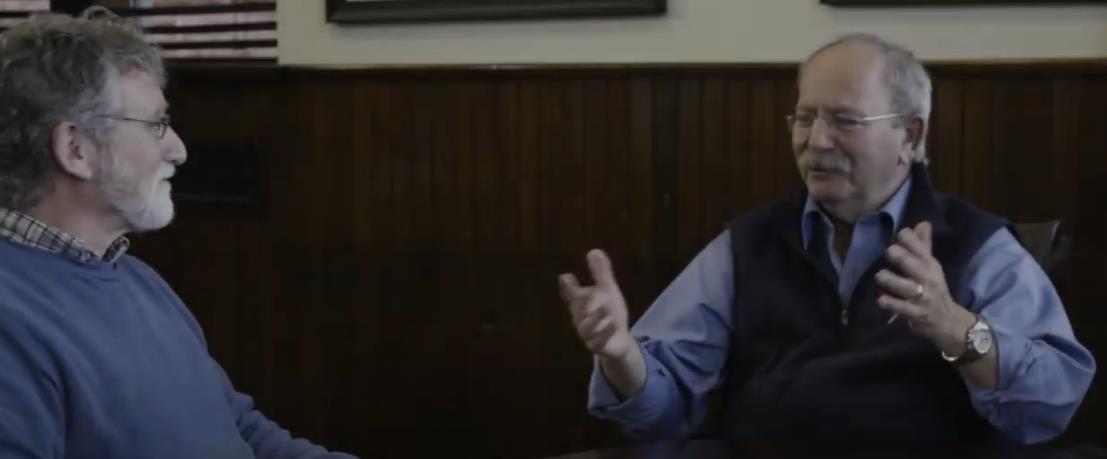
But Syria is not the only war-torn part of our planet.
Click here or the photo below to learn how Rotary Promotes Peace.
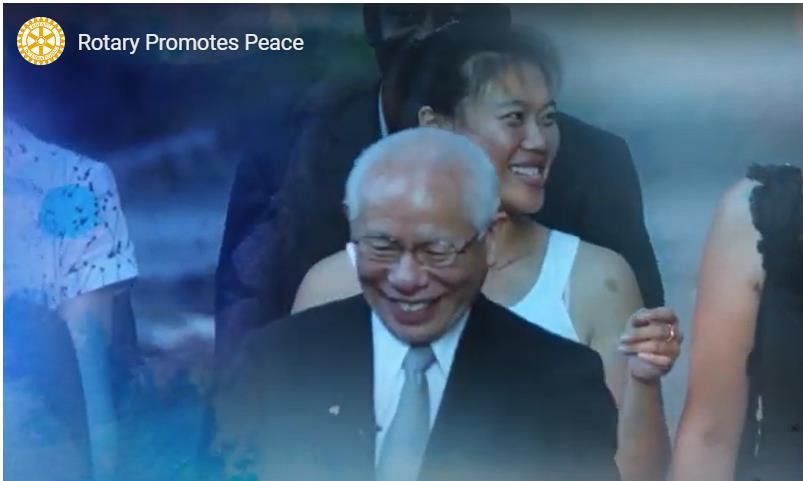
February 2023 - D6330 , 2020 Page 7
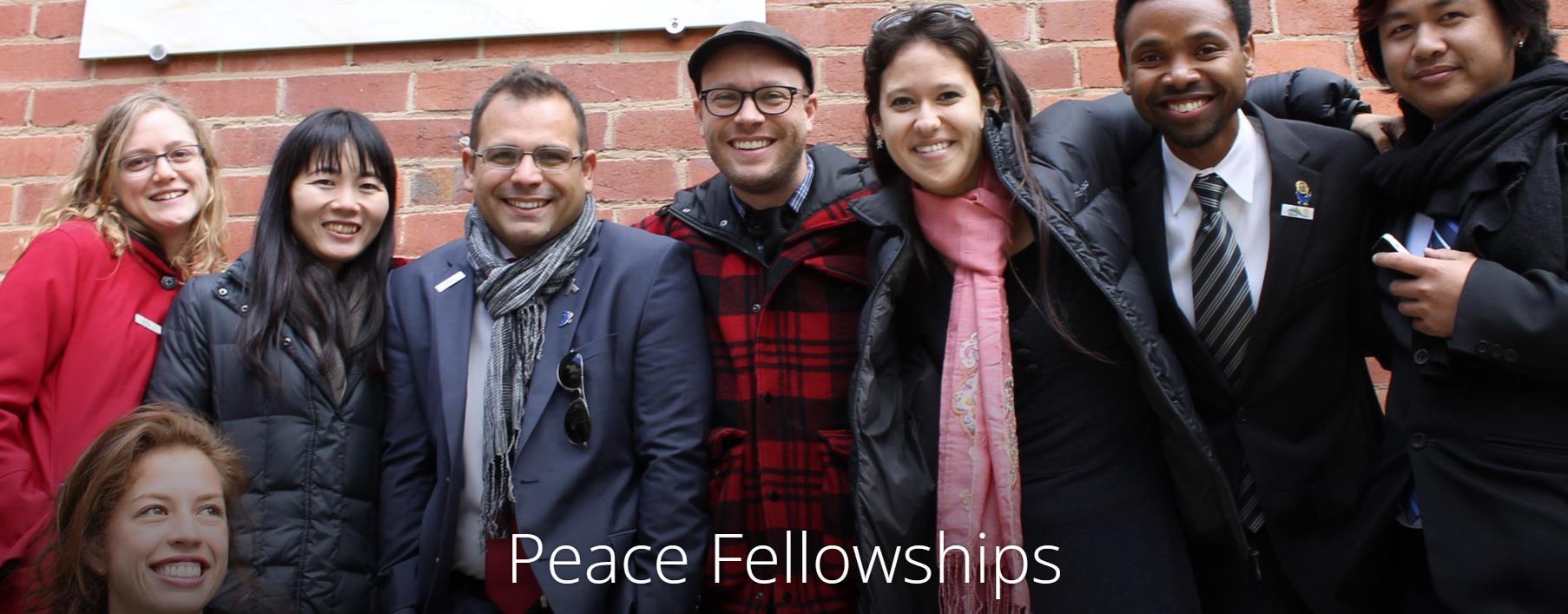
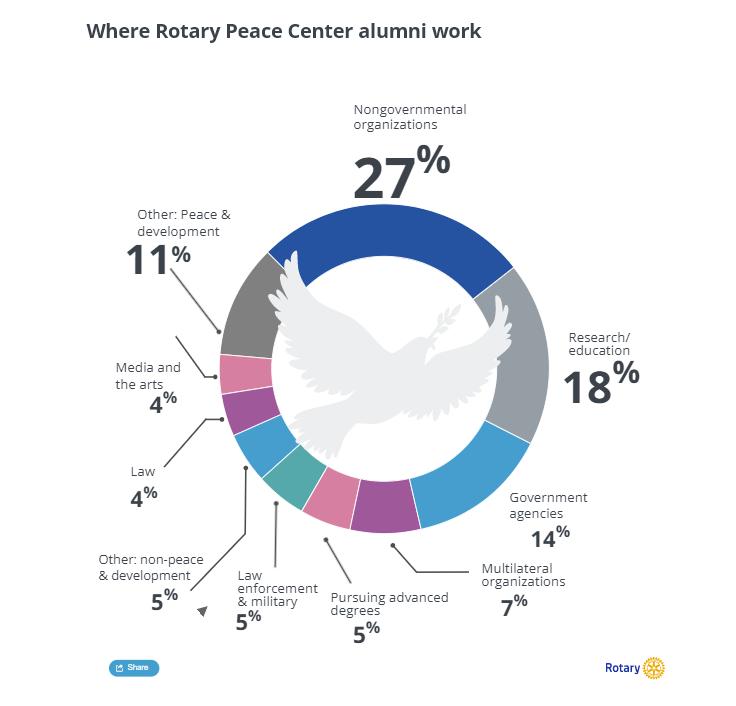
February 2023 - D6330 , 2020 Page 8
Police officer takes the lessons of the Rotary peace program to the streets of Philadelphia
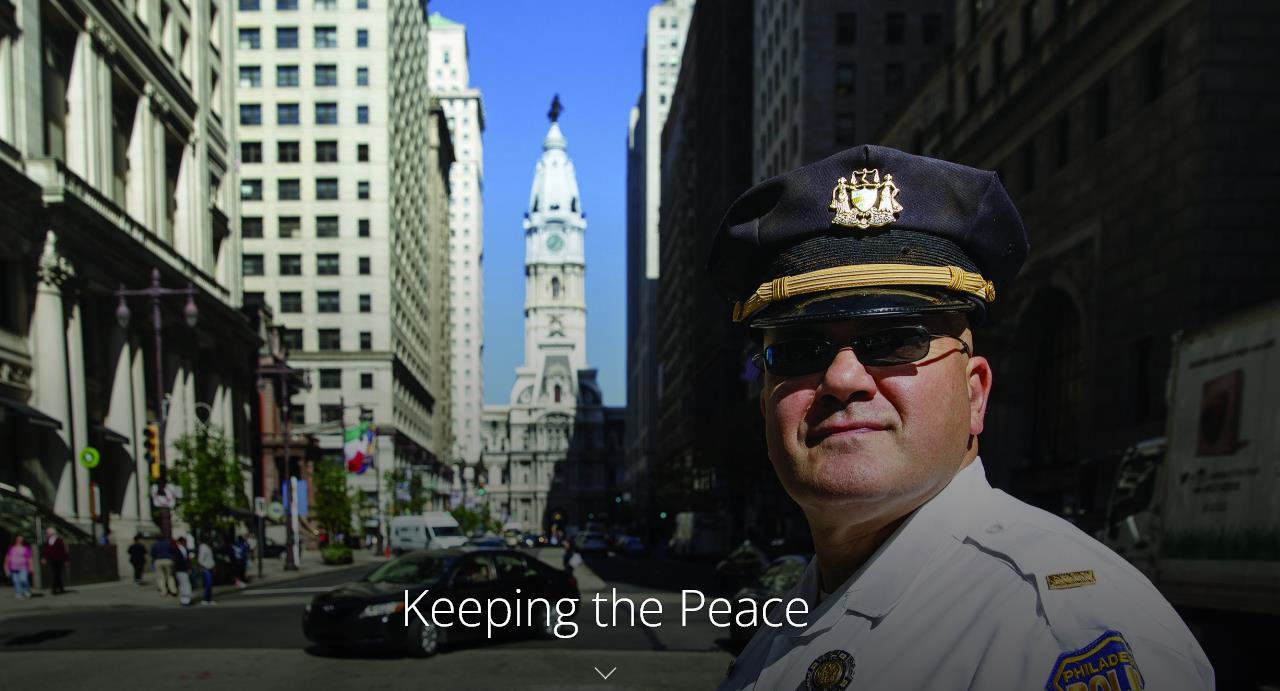 By Bryan Smith Photographs by Matt Stanley
By Bryan Smith Photographs by Matt Stanley
The tension is palpable as we cruise through a neighborhood of dilapidated row houses in one of the toughest parts of Philadelphia. Buildings jaggedly rise from the street – like a mouth full of busted teeth.
Lt. D.F. Pace nods to acknowledge a stare. He understands.
In his 15-year career with the Philadelphia Police Department, Pace has taken pride in being naturally tolerant and level-headed, qualities that helped him rise through the ranks.
But he is human. To maintain a level head under pressure, at times he uses several techniques he learned through the Rotary Peace Fellowship program.
In 2010, Pace applied for the intensive three-month professional certificate program in Thailand. The idea had come to then-Police Commissioner Charles Ramsey through a suggestion from the Philadelphia Rotary Club, the 19th-oldest Rotary club in the world. Pace relished the challenge. “As soon as I saw it, I said, ‘This is a once-in-a-lifetime opportunity.’”
Even before events like what happened in Ferguson (Mo.), I saw an unease developing between police and the community. I thought, ‘If we don’t get a handle on this, the lid’s going to come off.’
Pace saw the fellowship as a way to defuse a developing powder keg. “Even before events like what happened in Ferguson [Mo.], I saw an unease developing between police and the community,” he recalls. “I thought, ‘If we don’t get a handle on this, the lid’s going to come off.’”
The growing tension between police and residents also troubled members of the Philadelphia Rotary Club. They considered a few ideas until Joseph Batory, then scholarship chair of the club, had a light-bulb moment: the peace fellowship.
February 2023 - D6330 , 2020 Page 9
Lt. D.F. Pace
“Sometimes the obvious is right in front of us,” says Batory. “It finally dawned on me that a police officer is at the very forefront of violence prevention and peacebuilding and, as such, would be a great fit for Rotary’s threemonth certification program.”
In D.F. Pace, known as “D” to friends, Batory believed the club had found the perfect candidate: “He was an up-and-coming young lieutenant with patrol experience on the streets, but he’s also a lawyer and thus wellversed in the legal aspects of proper policing,” he says. “He reflected Commissioner Ramsey’s vision of creating a new generation of police officers with enhanced professionalism, dramatically improved judgment, and dedication to being instruments of peace.”
Friction, racial and otherwise, between police and the people they protect is not new. But the killings of unarmed black men by police in recent years, captured on camera phones and broadcast on the nightly news, have indeed touched a match to the kindling that Pace and others saw piling higher and higher.
Click here to read the rest of this article.
Peace Fellowships – Master’s Degree Programs
The ideal candidate is academically strong, has a bachelor’s degree in a related field, and has work experience in peace and development. We are looking for early-career candidates who demonstrate a commitment to peace and conflict resolution, are able to undertake extensive reading and research, and are able to participate actively within a diverse cohort of students.
Successful candidates have both a record of prior achievements in peacebuilding and potential for future growth and impact as leaders in the field resulting from their participation in the fellowship. After the program, candidates should be willing to share their own work and experience, staying in touch with peace fellows in their region and maintaining strong connections with Rotary members.
Master’s degree candidates must also:
• Be proficient in English
• Have a bachelor's degree

• Have a strong commitment to cross-cultural understanding and peace as shown through professional and academic achievements and personal or community service
• Potential for leadership
• Have at least three years of full-time relevant experience in peace or development work
Candidates must have at least three years between the completion of their most recent academic degree program (undergraduate or graduate degree) and their intended start date for the fellowship. Candidates currently enrolled in an undergraduate or graduate program are not eligible to apply.
Rotary Peace Fellows who have completed the certificate program, or a Global Grant Scholarship, must wait three years between the end date of that program and their intended start date for the fellowship.
February 2023 - D6330 , 2020 Page 10
We encourage people with disabilities and from other diverse backgrounds to apply. Rotary provides reasonable accommodations as needed to people with disabilities.
You are not eligible if you are an active Rotary member, employee of a Rotary club, Rotary International, or other Rotary entity.
Learn more about eligibility restrictions
Peace Fellowships – Professional Development Certificate Programs
The ideal candidate is a proven mid-career peace and development leader with at least five years of relevant work experience. Candidates need to come to the program with a social change initiative to promote peace and development within the program region and have a clear vision of how the fellowship experience and network will help advance their peace work and increase their impact.
This program is intended for working professionals and requires 11 weeks of on-site participation. Fellows earn a post-graduate diploma upon completion of the program. After the program, candidates should be willing to share their own work and experience, staying in touch with peace fellows in the region and maintaining strong connections with Rotarians.
Certificate candidates must also:
• Be proficient in English
• Have a bachelor’s degree
• Have at least five years of full-time relevant experience in peace or development work

• Have a strong commitment to cross-cultural understanding and peace as shown through professional and academic achievements and personal or community service
• Demonstrate leadership skills
• Be able to explain how their plan to promote peace aligns with Rotary’s mission
• Candidates for Makerere University: Either be from Africa, have worked in Africa, or work with African communities or initiatives outside the continent.
Candidates must have at least three years between the completion of their most recent academic degree program (undergraduate or graduate degree) and their intended start date for the fellowship. Candidates currently enrolled in an undergraduate or graduate program are not eligible to apply.
Rotary Peace Fellows who have completed the master’s degree program, or a Global Grant Scholarship, must wait three years between the end date of that program and their intended start date for the fellowship.
We encourage people with disabilities and from other diverse backgrounds to apply. Rotary provides reasonable accommodations as needed to people with disabilities.
You are not eligible if you are an active Rotary member, employee of a Rotary club, Rotary International, or other Rotary entity. Learn more about eligibility restrictions
February 2023 - D6330 , 2020 Page 11
ROTARY PEACE FELLOW CANDIDATES
Recruit Rotary Peace Fellow Candidates from your community
Districts and Rotary and Rotaract clubs play a key role in recruiting and recommending Rotary Peace Fellow candidates. Each year, The Rotary Foundation awards fellowships to leaders in peace and development to study at one of the Rotary Peace Centers at premier universities around the world. The fellows can earn a master’s degree or a professional development certificate. The application will be open early February through 15 May this year, and selected peace fellows will begin their studies in 2024. Find out who is eligible and what they need in order to apply.
If you know any midcareer change-makers or any young professionals who have peacebuilding experience, help them apply for a fully funded Rotary Peace Fellowship. Connect with your district Rotary Peace Fellowship subcommittee chair to learn more about members’ role in selecting peace fellows and get involved.
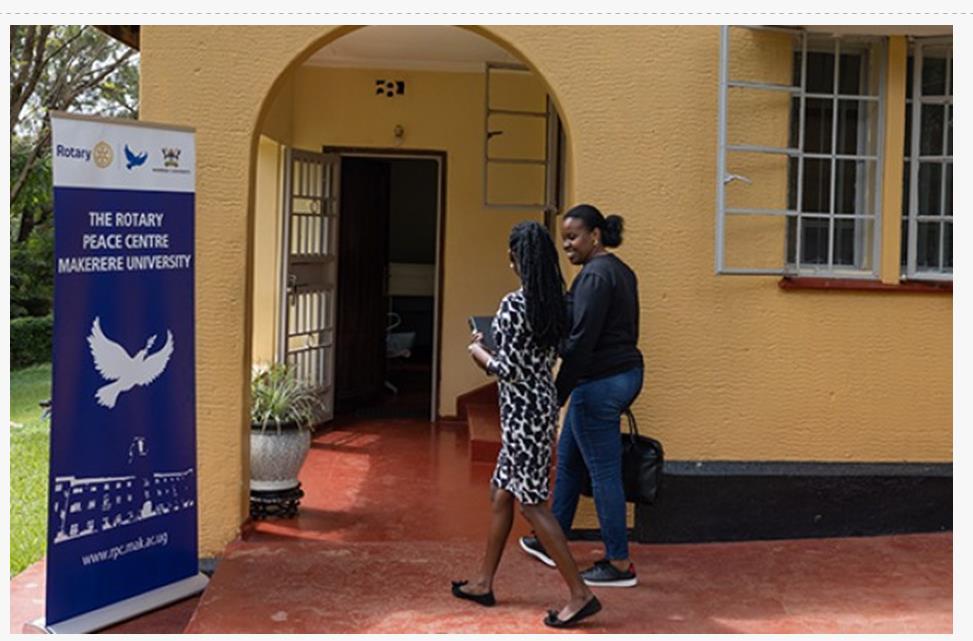
Since the Rotary Peace Centers program began in 2002, more than 1,600 fellows have graduated from our programs. They are now working on peace and development initiatives in more than 140 countries. Many serve as leaders in government, nongovernmental organizations, education and research institutions, peacekeeping and law enforcement agencies, and international organizations like UNICEF, the United Nations, the World Bank, and the International Federation of Red Cross and Red Crescent Societies. Follow the Rotary Peace Centers Facebook page for updates about peace fellows’ work.
Click here to read more
February 2023 - D6330 , 2020 Page 12
What are Rotary Peace Centers?
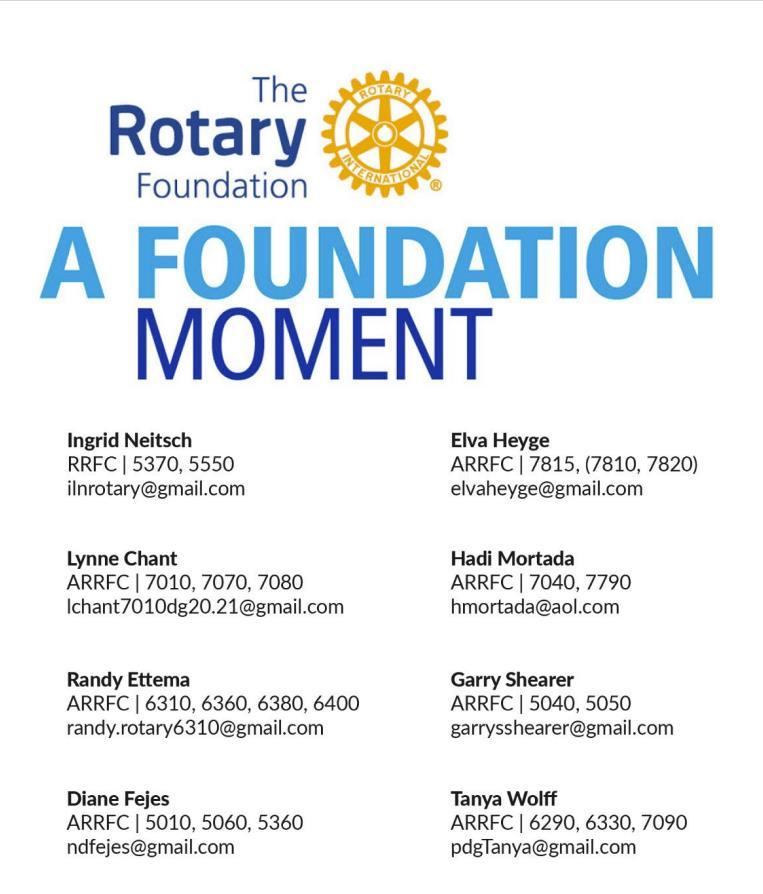
Teaching peace is no different than any other skill. It can be cultivated with the right practice, passion, and guidance.
The seven Peace Centers – located in Bangkok, Thailand; Durham and Chapel Hill, North Carolina, USA; Bradford, England; Tokyo, Japan; Brisbane, Australia; Kampala, Uganda; and Uppsala, Sweden – guide peace fellows to become catalysts of peace. Through academic training, practice, and global networking opportunities the Rotary Peace Fellowship leads to fulfilling careers that involve building peace in their everyday lives.
• 93 per cent of working alumni have a job connected to peace development
• 90 per cent of alumni have opportunities to connect and collaborate with Rotary networks and partners
• $188 million USD has been contributed to the program
February 2023 - D6330 , 2020 Page 13
PEACE SCHOLARS SPEAK
"I am amazed at the array of topics I have been able to dive into during my time at Makerere University. The diverse body of fellows and the depth of knowledge and expertise of my lecturers at Africa’s most prestigious University is extraordinary. The lecturers don't just bring with them titles of doctorship or professorship, but very practical experiences that have made it easy to grasp many theoretical approaches to peacebuilding."
Patience Rusare
"The teachers, trainers, and other practitioners come from different professional and educational backgrounds. Their well-prepared classes combined with their facilitation skills, the well-oriented class discussions and other assignments highly increased our theoretical knowledge of peacebuilding and conflict transformation. This knowledge was later reinforced with the enriching field excursions and other site visits to various organizations and institutions working on positive peace.”
Fikiri Nzoyisenga
“The Rotary Peace Fellowship program came at a point in my life where I wanted to validate my work. Some of the skills I took back from the fellowship include better communication in the nonviolent space. I feel supported by this community and can reach out to any peace fellow in the world.”
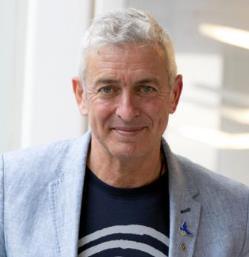 ElsaMarie D’Silva, CEO, Red Dot Foundation
ElsaMarie D’Silva, CEO, Red Dot Foundation
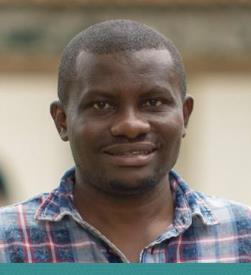
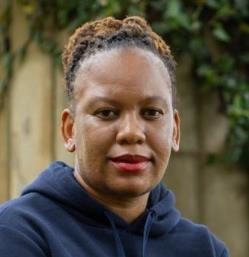
“I found the Rotary Peace Fellowship program because of my interest in prevention of trauma and abuse and wanted to learn more about peacebuilding, conflict resolution, and mediation since a large part of trauma is related to interpersonal violence.”
Sombat Tapanya, clinical psychologist and assistant professor at Chiang Mai University
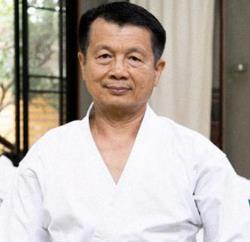
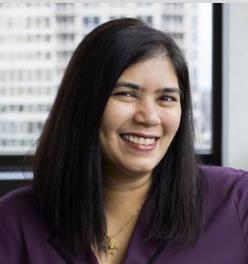
“The fellowship opened up my thinking, created new pathways, provided a new set of tools, and most important, opened up a whole new network of people and resources.”
Charlie Allen, Director of Partnerships, Institute for Economics and Peace
Source: https://www.rotary.org/en/our-programs/peace-fellowshipscertificate-program
February 2023 - D6330 , 2020 Page 14
DISTRICT 6330 GRANTS REPORT – from Myrna Inglis
ARE YOU PLANNING A PROJECT FOR 23-24?
Do you want to use an additional $2,000 USD from a District Grant to fund the project? $2000 is the maximum grant allocation per Club.
WHAT YOU NEED TO KNOW –
• Does your Club support the Rotary Foundation Annual Fund
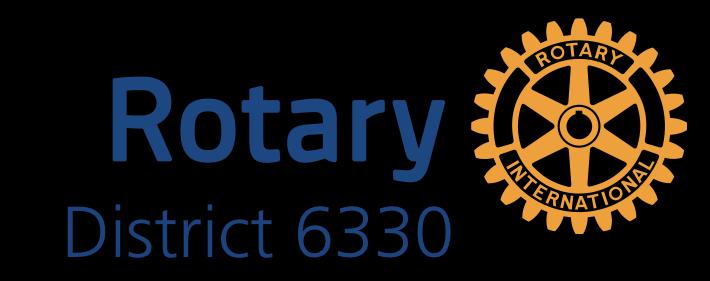
• Does your Club have 2 members qualified for District Grants? The Qualification Course is available online under both the Foundation and Learning Headings on the District 6330 Home page
• Have your President and President-Elect signed and sent in the MOU, also available in the same area
• Does the research on the project idea support an established need and has a preliminary budget been developed.
• The deadline for submitting a Project Proposal is May 31, 2023
The projects for 22-23 are demonstrating Rotarians at work in Kenya, Mexico, Eswatini, Tanzania, South Africa, as well as helping many homeless and refugees in our District. Literacy projects included Little Free Libraries, supplying children with a locally written book and scholarships to a new Nursing Degree program.
For other ideas, check out the information under the Foundation Banner of the District Home page. Then go to Club projects to find a complete listing of the projects in 2021-22 and 2020-21.
For those currently working on a project, please complete it as soon as you can and then fill in the Final Report or Individual Project Report in ClubRunner. Final Reports are dues May 31, 2023.
Should you have questions about District Grants, please contact me at minglis65@hotmail.com
Myrna Inglis Chair, District Grants
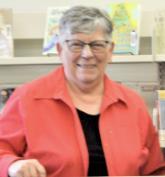
February 2023 - D6330 , 2020 Page 15
Myrna Inglis, D6330 Grants Chair
WHEN YOU DONATE TO TRF
Thank you to everyone in D6330 who has given to the Foundation, who has participated in a Foundation project, or has helped spread the word about the Foundation. Thank you!
Click here to view a short video about your contributions to TRF and the good that you do! We’re changing lives through our vision and unwavering commitment, bringing hope to those who need it most.
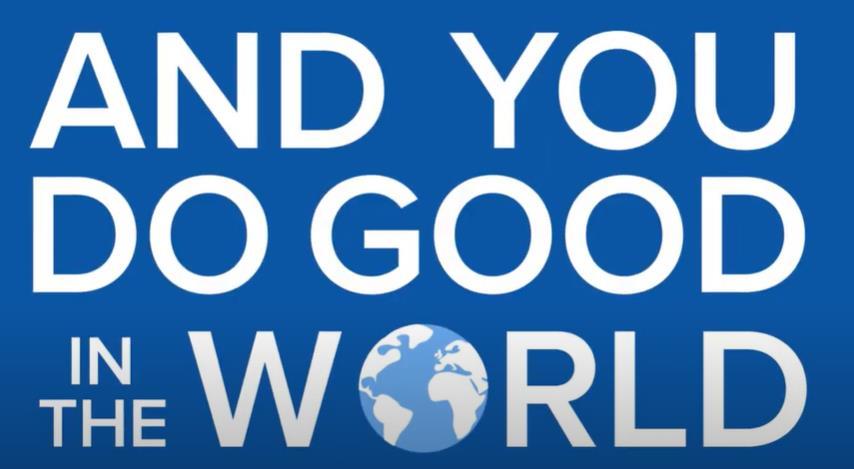
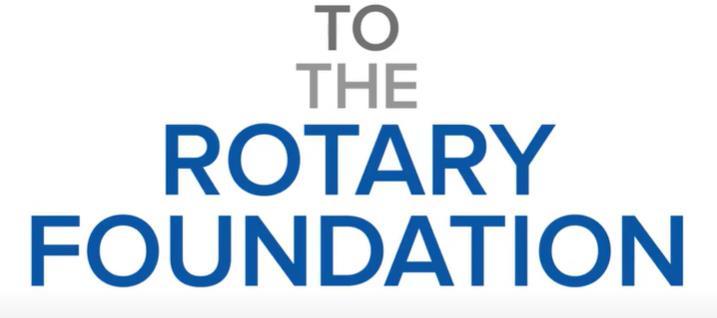


February 2023 - D6330 , 2020 Page 16
Summary of new polioviruses this week:


• Afghanistan: two WPV1 positive environmental samples
• Algeria: one cVDPV2 positive environmental sample
• Cameroon: one cVDPV2 case
• Chad: two cVDPV2 cases
• DR Congo: 16 cVDPV1 cases and 19 cVDPV2 cases
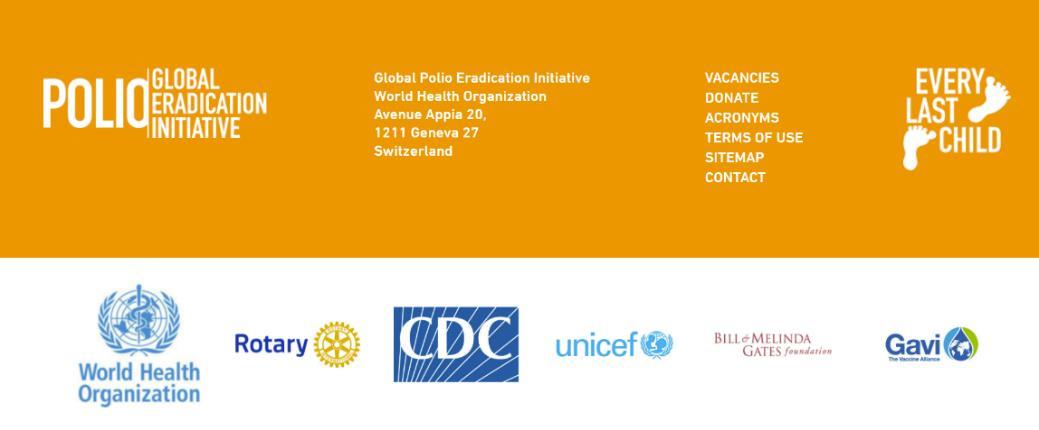
• Nigeria: one cVDPV2 case
• Somalia: one cVDPV2 case
• Zambia: two cVDPV2 positive environmental samples
For more information, click here - http://polioeradication.org/polio-today/polio-now/this-week/ Click here to learn the difference between Wild Polio Virus (WPV) and Vaccine-derived Polio Virus. (VDPV)
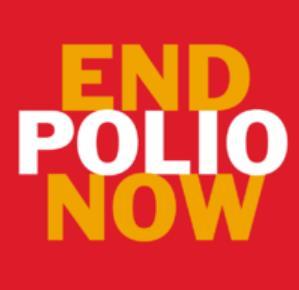

February 2023 - D6330 , 2020 Page 17 T
OUR GOAL – OUR GOAL – OUR GOAL
Rotary has been working to eradicate polio for more than 35 years! Our goal of ridding the world of this disease is closer than ever.
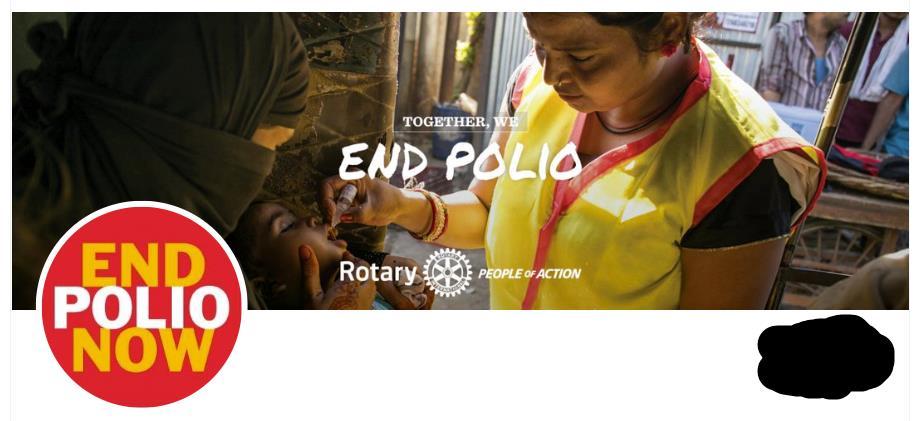
As a founding partner of the Global Polio Eradication Initiative, we’ve reduced polio cases by 99.9 percent since our first project to vaccinate children in the Philippines in 1979.
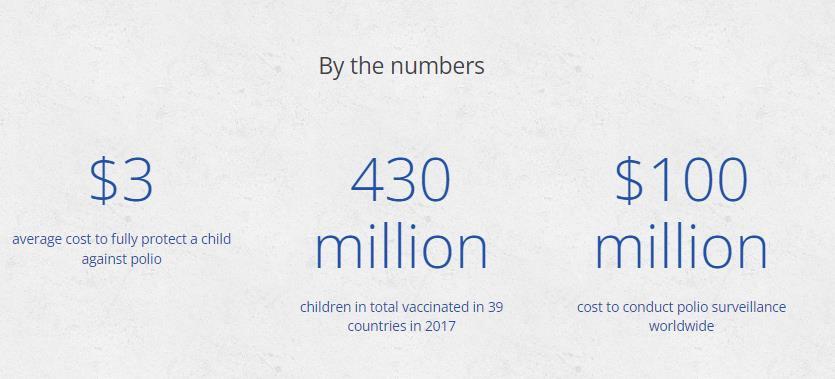
Rotary members have contributed ore than $2.1 billion and countless volunteer hours to protect nearly 3 billion children in 122 countries from this paralyzing disease. Rotary’s advocacy efforts have played a role in decision by government to contribute more than $10 billion to the effort.
Today, polio remains endemic only in Afghanistan and Pakistan. But it’s crucial to continue working to keep other countries poli-free. If all eradication efforts stopped today, within 10 years, polio could paralyze as many as 200,000 children each year.
February 2023 - D6330 , 2020 Page 18
“To succeed by 2023”
Extraordinary joint statement to Polio Eradicators
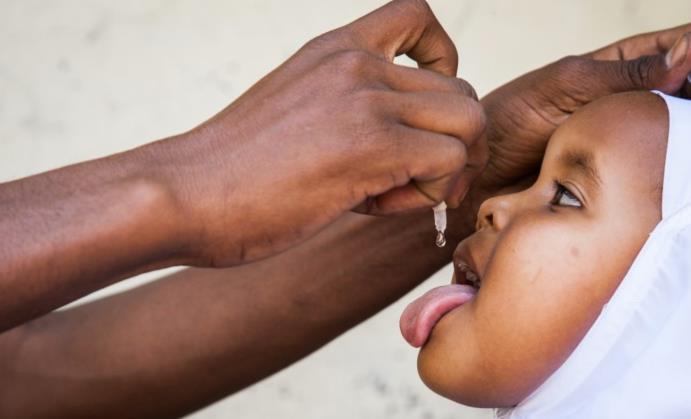
As the Global Polio Eradication Initiative (GPEI) enters its 31st year, the Chairs of the effort’s main global advisory bodies issue an extraordinary joint statement, urging all involved in the effort to excel in their roles.

In an extraordinary joint statement by the Chairs of the main independent, advisory and oversight committees of the GPEI, the Chairs urge everyone involved in polio eradication to ensure polio will finally be assigned to the history books by 2023.
The authors are the chairs of the Strategic Advisory Group of Experts on immunization (SAGE), the Independent Monitoring Board, the Emergency Committee of the International Health Regulations (IHR) Regarding International Spread of Poliovirus and the Global Commission for the Certification of the Eradication of Poliomyelitis (GCC).
The Endgame Plan through 2018 has brought the world to the brink of being polio-free. A new Strategic Plan 20192023 aims to build on the lessons learned since 2013.
The joint statement urges everyone involved in the effort to find ways to excel in their roles. If this happens, the statement continues, success will follow. But otherwise, come 2023, the world will find itself exactly where it is today: tantalizingly close. But in an eradication effort, tantalizingly close is not good enough.
The statement therefore issues an impassioned plea to everyone to dedicate themselves to one clear objective: to reach that very last child with polio vaccine. By excelling in our roles. It means stepping up the level of performance even further. It means using the proven tools of eradication and building blocks that have been established in parts of the world that have been free of polio for years.
The Chairs remind us that as a global community, we have stood where we stand today once before, with smallpox. And we achieved the eradication of smallpox. And the world is a much better place without smallpox.
So, let us make the world again a better place. Together. Let us eradicate polio.
Click here to read more
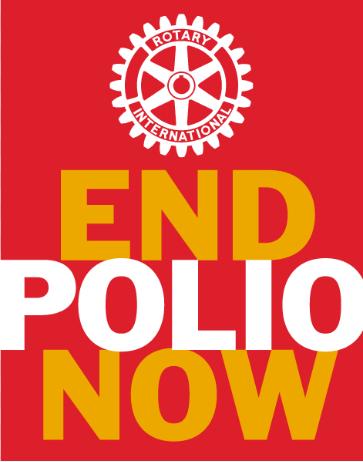
February 2023 - D6330 , 2020 Page 19
Zero-dose children in seven subnational consequential geographies hold key to success.
Polio programme must keep clear focus in 2023 on adapting operations amid broader humanitarian emergencies
2023 is a critical year for the global effort to eradicate polio.
It is the year where all remaining poliovirus transmission globally is slated to be fully interrupted, per the GPEI Polio Eradication Strategy 2022-2026
A unique epidemiological window of opportunity is presenting itself at the start of the year, that we must capitalize on.
So, what is the programme’s focus for achieving success this year? The answer is: reaching zero-dose children in the most consequential geographies.
This year, the polio programme is focusing on reaching zero-dose children (children who are either un- or under-immunized), in identified “consequential geographies.”
But what exactly are consequential geographies, and why are they so vital to the global effort to eradicate polio? In this explanatory video, long-time polio eradicator and Director for polio eradication at WHO’s Eastern Mediterranean Region, Dr Hamid Jafari, explains more.
Click here to read more.

Click here to learn more.
Click here to view a short video on consequential geographies.
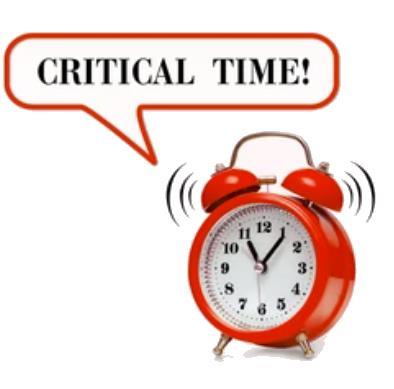
February 2023 - D6330 , 2020 Page 20 2023
Polio-free India – It seemed impossible until it was done.

Dr Hamid Jafari, Director of Polio for the WHO’s Eastern Mediterranean Region, reflects on his time eradicating polio in India and what lessons we can take from this to address the final challenges for achieving eradication in Afghanistan and Pakistan.
India’s journey from the world’s epicentre of a highly infectious viral disease to turning polio-free was like walking on eggshells: Every step we took mattered.
On 13 January 2023, India completes 12 polio-free years – a remarkable achievement that was made as a result of consistent, determined efforts and genuine commitment at all levels.
I spent close to six enriching years of my life serving as the project manager of the National Polio Surveillance Project (NPSP) for WHO India. My work entailed providing technical assistance and strategic guidance to the national programme. I was also in charge of poliovirus surveillance, monitoring mass vaccination campaigns, crafting corrective measures and strategies, and working closely with government counterparts at all levels to ensure every child was vaccinated enough times to build their immunity. We delivered around 1 billion doses of polio vaccine to 172 million children each year over the course of four years leading up to the last case. And many more in the years after.
Taking a step back to reflect on this journey, there were several factors contributing to the monumental success of ending polio in India. The first fundamental factor was government commitment that consistently translated into diligent administrative action at the operational level. Even the district administrators were fully aligned with and committed to taking corrective measures based on evidence: accepting programmatic gaps and challenges and then committing to addressing them urgently.
The second, was the effective multi-actor system that allowed us as partners to provide technical assistance needed at the implementation level. We had the evidence: real-time data, including monitoring data, at the operational level that guided timely corrective actions. This data was put to good use – to recommend changes that the government took on board. I must emphasize both individuals’ and institutional willingness to make changes based on evidence mattered.
Click here to read the rest of this excellent article.
February 2023 - D6330 , 2020 Page 21
FROM THE DISTRICT…
PUT A PLUS IN YOUR ROTARY LIFE!
OUR NEW POLIOPLUS SOCIETY!
District 6330 is excited to announce the rolling out of our new PolioPlus Society.
The PolioPlus Society is an organization of like-minded individuals who have committed to contribute $100 or more each and every year to PolioPlus until the world has been declared free of the Wile Polio Virus. This is our commitment to fulfil the promise Rotary made in 1985 to immunize all the children of the world.
It's easy and rewarding to become a member. Complete and submit the PolioPlus Society Pledge Form and email it to Katherine Hahn, Polio Chair at katherinehahn@rotarystratford.com
Then complete your contribution commitment in one of the ways below:
1. Credit Card. Contribute with your credit card online at: https://www.endpolio.org/donate. OR

2. Check/cheque. Make out a check for $100 or more to The Rotary Foundation, with “Polio Plus” in the Memo section and submit to your Rotary Club’s Foundation Chair. OR
3. Rotary Direct. Enroll in Rotary’s recurring giving program, Rotary Direct, which makes giving easy, fast, and secure. You can schedule a monthly, quarterly, or annual donation that empowers Rotarians to change lives in communities around the world. (https://my.rotary.org/en/rotary-direct)

ALL donations will be matched 2 to 1 by the Bill and Melinda Gates Foundation. Anyone can join the society, not only Rotarians.
Everyone will be honoured with aspecial pin, an End Polio Now bracelet, a Society Certificate, and a great feeling in their heart.
With your help, we will reach every last child and achieve a polio free world. Please reach out to Katherine and Sign up today!
Yours in Rotary, Katherine Hahn

6330 District Governor-Nominee Polio Plus Chair
(519) 272-4859
February 2023 - D6330 , 2020 Page 22
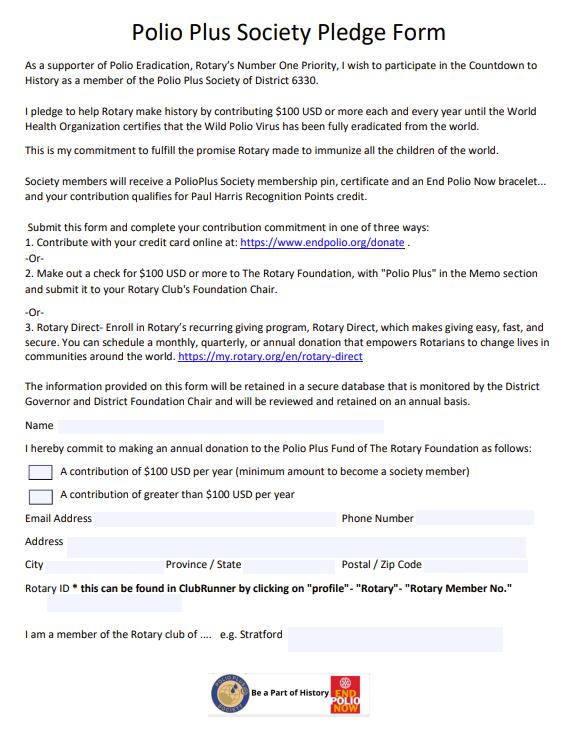
February 2023 - D6330 , 2020 Page 23
PAUL HARRIS SOCIETY


What your giving supports
Supporting families and changing lives! By giving from your heart each and every year, you’ll support families and change lives.
Paul Harris Society gifts have helped provide:

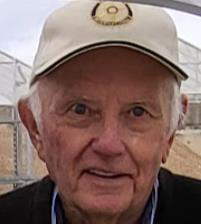
• Vocational training for teachers establishing an early childhood education center in South Africa
• Water filters, toilets, and hygiene training to prevent fluorosis, diarrhea, and other diseases in India
• A scholarship for a medical professional in Italy to research treatments that minimize mortality rates among premature babies
• Peace-building seminars for 200 teachers and 1,300 students in Uganda
• Treated mosquito nets and medical services that prevent malaria in Mali
In District 6330 we are proud to have over 116 members in our Paul Harris Society.
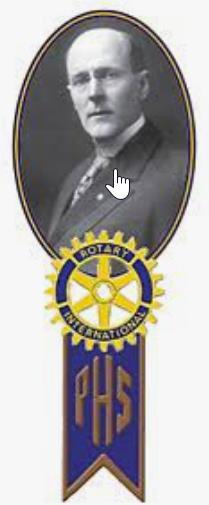
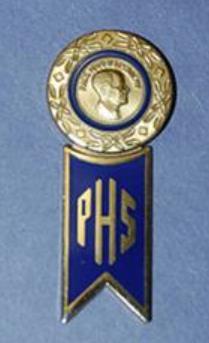
We have over 32 of our clubs that now have members in the Paul Harris Society.

February 2023 - D6330 , 2020 Page 24
D6330 Paul Harris Society Chair is Rotarian Jamie Pole.
Rotarian Jamie Pole
The Beginnings of Rotary –

continued from last month
Minority Membership
Rotary formally considered the issue of racial restriction in membership and determined that the organization could not allow racial restrictions to the organization’s growth. In Rotary’s legislative deliberations in June 1921, it was formally determined that racial restrictions would not be permitted. Non-racialism was included in the terms of the standard constitution in 1922, required to be adopted by all member clubs.
Rotary and other service clubs in the last decade became open to homosexual membership. Other minorities, in the face of general changes in demographics are also encouraged to join.
Tolerance of Differences
Tolerance is one of the most important virtues in the Rotary spirit. As early as 1911, our founder Paul Harris in his essay Rational Rotarianism said, “If by interposition of Providence I someday were to find myself standing on a platform in some great Coliseum looking into the eyes of every living Rotarian, and were to be told that I could have one word to say, without an instant’s hesitation and at the top of my voice, “ would shout “Toleration!”
Our founder, Paul Harris, has repeatedly iterated: “Rotarians respect each other’s opinions and are tolerant and friendly at all times. Catholics, Protestants, Muslims, Jews, and Buddhists break bread together in Rotary.” And it is this tolerant attitude that prompted the Rotary International to adopt the following statement in 1933: “Rotarians in all countries should recognize these facts (differences), and there should be a thoughtful avoidance of criticism of the laws and customs of one country by the Rotarians of another country.” Tolerance is a key to understanding among different peoples and nations.
Catholicism and Rotary
The problem seems to have started in Spain in 1928 when a bishop laid charges that Rotary was nothing but a new Satanic organization. The church also criticized and condemned Rotary for showing a concept of life of service without reference to church teaching. Indeed, it seems that the church believed it was a secret society with quasi-religious overtones. For whatever reason, the Vatican took up the reins and in 1929 it issued a decree that “it is not expedient” for Catholic priests to participate in Rotary either as member or guests. This decree and its application were worrisome to many Catholics in Rotary, not the least of which was then RI President Tom Sutton who was himself a Catholic.
Critical and at times disparaging articles regularly appeared in Catholic newspapers. Sutton’s attempts to convince the Secretary of State at the Vatican were fruitless and the anti-Rotary articles continued to be published.
February 2023 - D6330 , 2020 Page 25
The factual errors were shown to be false and by 1933 there was a mood swing in the Vatican. Priests were now allowed to use their discretion about attending or even joining Rotary. Nevertheless, one of the results of the church attitude was a slow development of Rotary in predominantly Catholic countries such as Ireland.
The uneasy peace continued until 1951 when yet another Vatican decree warned Priests that they should not join Rotary and that the faithful should be aware of seditious and suspected organizations.
But the world was changing, and the decree caused an immediate angry response among others, from the thenCatholic and RI President Arthur Laqueux, and even from the Rotarian, Catholic Bishop of Fort Wayne, Indiana, who publicly declared the decree “quite incomprehensible.”
Fairly son, the Vatican began to react and by the end of the decade, the Catholic Truth Society was able to declare that Rotary is neither secret nor seditious. Gradually, there was a thaw in the relationship between the church and Rotary. In 1970, Pope Pius VI addressed Rotarians in Italy and in 1979, Pope John Paul II spoke at the Rotary International convention in Rome praising many of Rotary’s humanitarian programs. Later, Pope John Paul II accepted a Paul Harris Fellowship and a World Understanding and Peace award from Rotary.
Finally, before becoming Pope Francis, then Cardinal Jorge Bergoglio accepted an honorary membership in the Rotary Club of Buenos Aires.
Some Rotary Firsts
• The first Rotary club meeting was in Chicago, Illinois, on February 23, 1905.
• The first regular luncheon meetings were in Oakland, California, chartered in 1909.
• The first Rotary convention was in Chicago in 1910.
• The first Rotary club outside of the U.S was chartered in Winnipeg, Manitoba, Canada, in 1910.
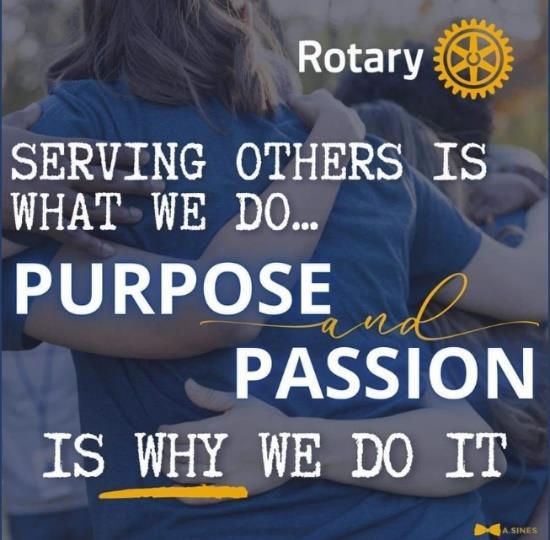
• The first Rotary club in South America waws chartered in Montevideo, Uruguay, in 1918.
• The first Rotary club in Asia was chartered in Manila, Philippines, in 1919.
• The first Rotary club in Africa was chartered in Johannesburg, South Africa, in 1921.
• The first Rotary club in Australia was chartered in Melbourne in 1921
• The first Rotary club in Northern California was chartered in Eureka in 1923.
Source: https://rotary1.org/101-things-about-rotary/
February 2023 - D6330 , 2020 Page 26
World Understanding and Peace Day – February 23
World Understanding and Peace Day takes place on February 23 every year. In 2023, Rotary turns 118!
This day is actually a commemoration of the first meeting of Rotary that was held. This meeting of businessmen, which aimed to be a space where their backgrounds didn’t matter, started the chain of events that led to the formation of Rotary International.
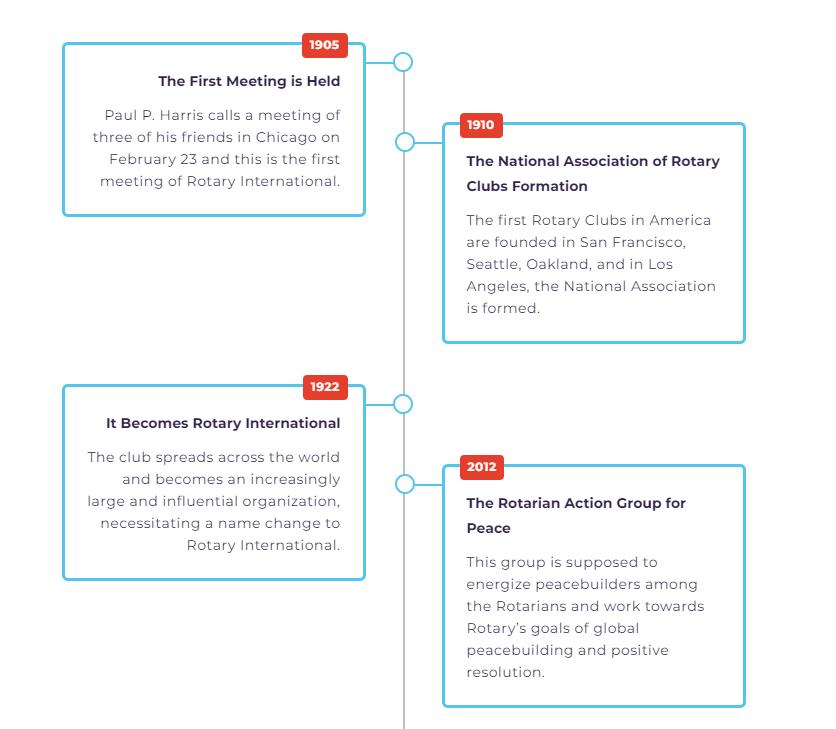
An international organization dedicated to humanitarian service as well as peace and goodwill throughout the world, Rotary International began in Chicago, U.S. The date of the first meeting has since become World Understanding and Peace Day, which is part of the World Understanding Month celebrations in February.

February 2023 - D6330 , 2020 Page 27
HOW TO OBSERVE WORLD UNDERSTANDING AND PEACE DAY THIS YEAR - ON FEBRUARY 23 - ROTARY TURNS 118!
1. Attend programs at your local Rotary Club
Rotary clubs across the world organize talks, events, and related programs to celebrate World Understanding and Peace Day through the month of February. You could attend a few and inspire your friends.
2. Begin a project for peace.
From art to community service, you can start any kind of project that promotes peacebuilding and conflict resolution. You could extend it by hosting it at your public library.

3. Learn more about conflict resolution.


Sign up for classes, read more on the Internet, or go for lectures and talks. Generally, become more informed about the processes of peace.
We believe in the cause. We want to be part of the change that encourages peace and understanding around the world. Hopefully, it will lead to wars coming to an end.
We want to spread information. Rotary International’s peace-building work is spread across nations. It’s an important space for people to learn from and contribute to peace.
We want to learn about peacebuilding. Rotary’s World Understanding an Peace Day is a great opportunity to explore how we can all contribute to peace around the world. Learn all you can today!
Click here to read more.
February 2023 - D6330 , 2020 Page 28
ROTARY IN UKRAINE
Click here to watch a short video on Rotary’s help to Ukraine.
Sponsor Ukrainian refugees

Rotary is collaborating with Welcome.US, an organization working to engage more Americans in welcoming newcomers, with a focus on sponsoring refugees.
Through Uniting for Ukraine, Rotary and Rotaract clubs and members in the U.S. can sponsor a person or a family that has fled the war and help them relocate to the U.S.
To sponsor a Ukrainian refugee family:
Sign up to be a sponsor today.
Learn more about sponsorship by downloading the Rotary-Welcome.US flyer
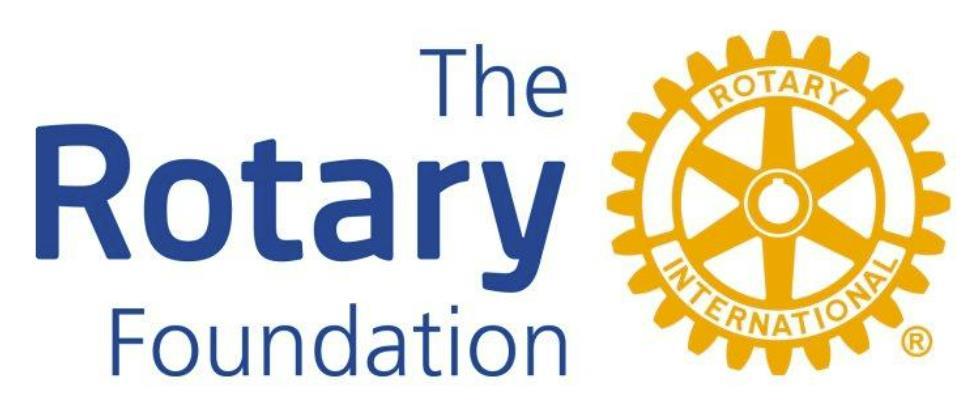
If you have further questions, write to trf.welcome@rotary.org.
Find more resources and answers to some common questions on the Welcome.US website.

February 2023 - D6330 , 2020 Page 29
And in case you missed it –
RI PRESIDENT-ELECT ANNOUNCES 2023-24 PRESIDENTIAL THEME
By Etelka Lehoczky
Rotary International Presidentelect R. Gordon R. McInally called for members to capture the world's attention and lead the way toward possibilities far beyond our current expectations.
McInally, a member of the Rotary Club of South Queensferry, West Lothian, Scotland, revealed the 2023-24 presidential theme, Create Hope in the World during the Rotary International Assembly in Orlando, Florida, USA, on 9 January.
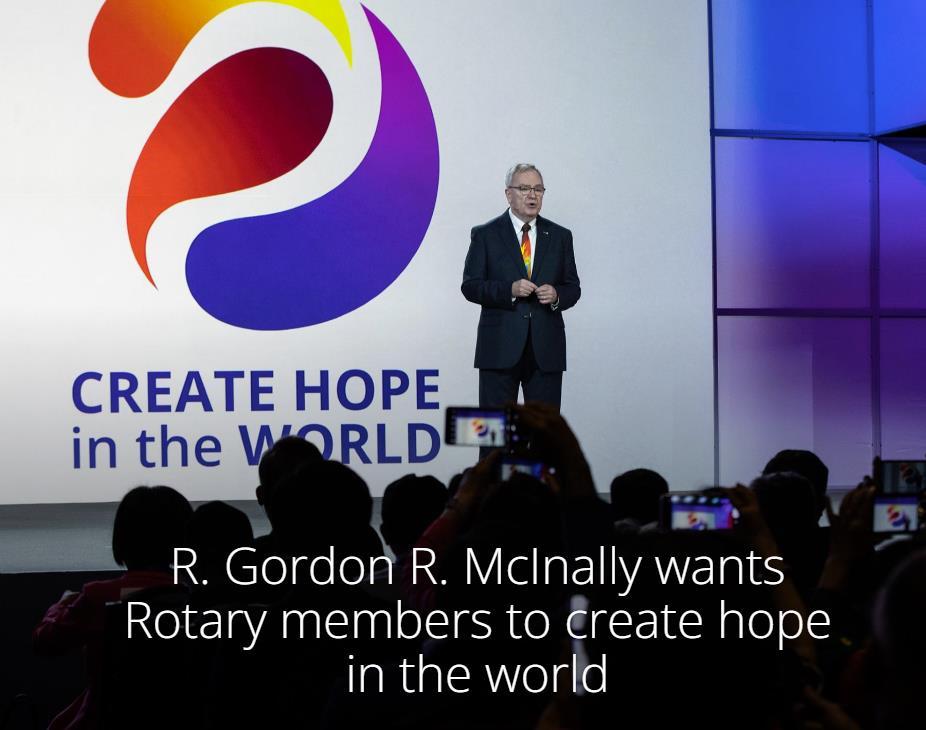
He urged members to promote peace in troubled nations, help those affected by conflict, and maintain the momentum of initiatives begun by past leaders.
Click here to watch the theme address – an inspiring speaker and inspiring presentation!
"The goal is to restore hope to help the world heal from destructive conflicts and, in turn, to help us achieve lasting change for ourselves," McInally said at Rotary's annual training event for incoming district governors.
McInally spoke about a woman he met in Ban Taling Chan, Thailand, where Rotary members helped built houses, a meeting hall, and childcare and health care facilities following the tsunami that devastated South Asia in late 2004. The woman had lost her husband, her daughter, and her son in the tsunami, as well as her livelihood. But she still had a gift to offer McInally: a beautiful seashell.
"She went on to tell me that Rotary... had restored her optimism. We gave her hope," McInally said.
"This is how Rotary brings lasting change to the world," he added, "one restored or newly created hope at a time."
Click here to read the full article.
February 2023 - D6330 , 2020 Page 30
The Rotary Foundation – the Engine that runs Rotary!
WAYS TO GIVE TO THE ROTARY FOUNDATION
Your donation changes lives! and this information bears repeating…
There are numerous ways to support The Rotary Foundation.
Every amount contributed to The Rotary Foundation is spent in support of humanitarian, educational, and cultural programs and their operations. Clubs and districts apply for and receive Foundation grants to carry out worthy projects worldwide.

Here are a few of the ways that your contribution can make a difference:
• $100 can buy textbooks for one elementary school in Zambia
• $5,000 can buy vaccine to immunize 10,000 children against polio
• $24,000 can buy an academic-year Rotary Foundation Ambassadorial Scholarship
• $100,000 can buy funding for two to complete a two-year graduate program for a Rotary World Peace Fellow
Donate Online
When you donate online, you get to choose where your donations go. Support thousands of service projects our people of action are tackling around the world. Outright gifts can be made easily with The Rotary Foundation online contribution form.
This method expedites processing your tax receipt and Paul Harris Fellow recognition points. For online donations please visit https://www.rotary.org/en/donate
• Memorial or Tribute Donations: A gift to The Rotary Foundation is a meaningful way to honour a loved one.
• Recurring Donations: Rotary Direct allows you to help year-round by automatically giving each month, quarter, or year

February 2023 - D6330 , 2020 Page 31
FOUNDATION GRANTS – 7 AREAS OF FOCUS
Rotarians can get involved in various types of service –Club Service, Community Service, International Service, Vocational Service, New Generations (Youth) Service
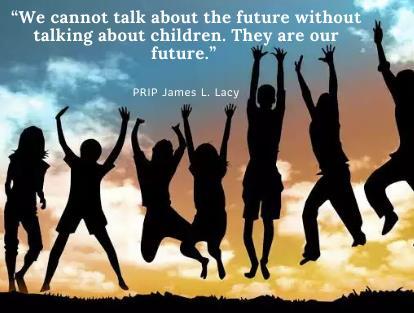
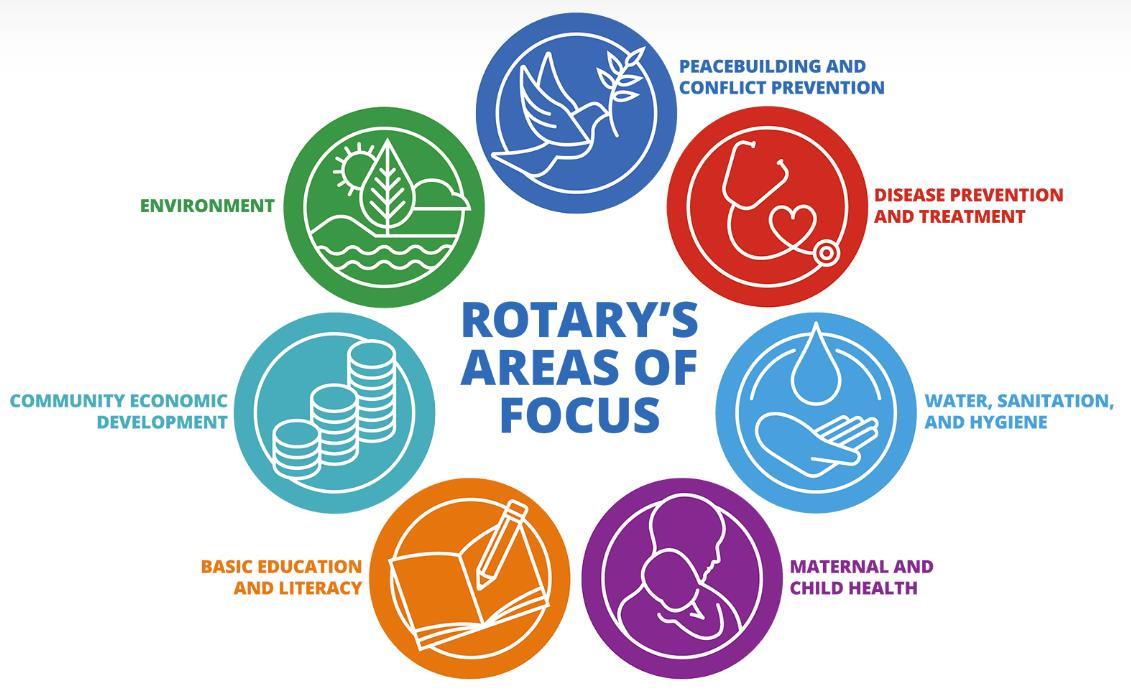
February 2023 - D6330 , 2020 Page 32
COMING IN MARCH – Water & Sanitation Month
2 billion people lack access to safely managed drinking water at home and 3.6 billion people, nearly half the world’s population, do not have access to safely managed sanitation in their home.
2.3 billion people lack basic hygiene services, including soap and water at home.



Rotary's projects give communities the ability to develop and maintain sustainable water and sanitation systems and support studies related to water and sanitation.
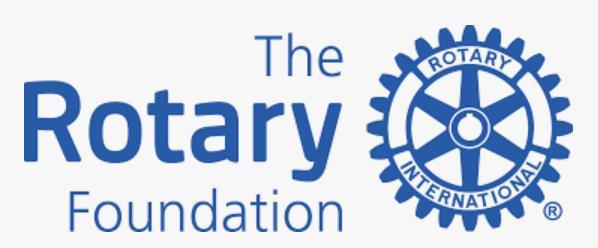
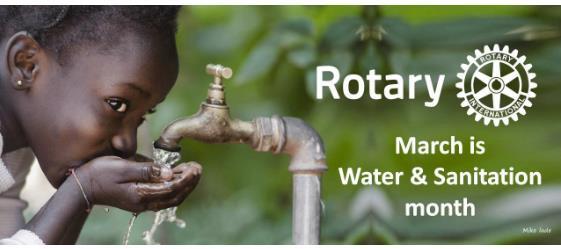
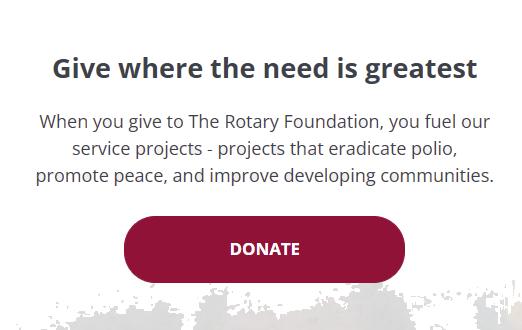
February 2023 - D6330 , 2020 Page 33
ROTARY’S CORE VALUES
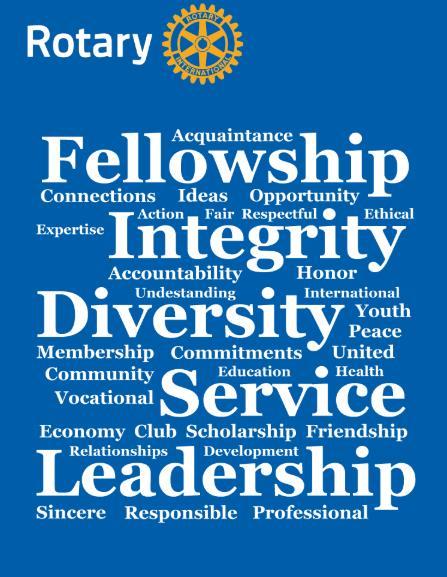
WHAT IS ROTARY?
Rotary International is an international service organization whose stated purpose is to bring business and professional leaders together to provide humanitarian service and to advance goodwill and peace around the world. It is a non-political and non-religious organization.
Rotarians can get involved in various types of service –Club Service, Community Service, International Service, Vocational Service, New Generations Service

February 2023 - D6330 , 2020 Page 34
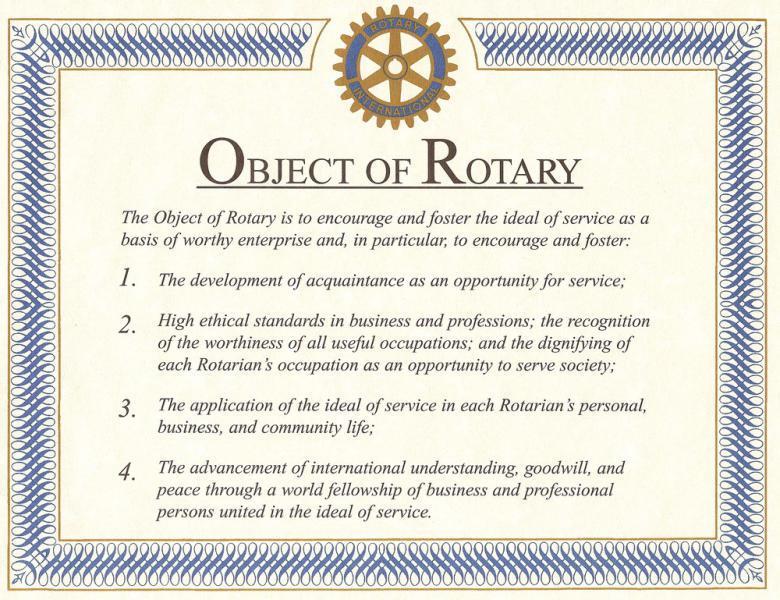
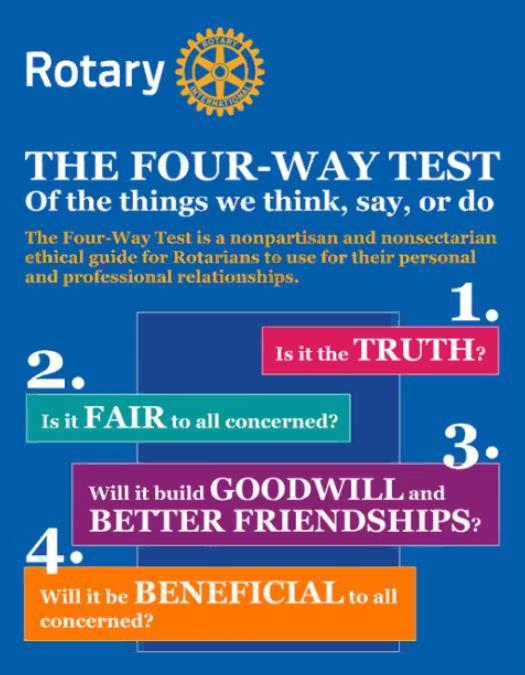
February 2023 - D6330 , 2020 Page 35
Click the 4-way test above to hear the Four-Way Test by RC of Saskatoon Nutana.
THE ROTARY FOUNDATION EREY – Every Rotarian Every Year

Our Every Rotarian, Every Year (EREY) initiative encourages all Rotary club members to contribute something each year to The Rotary Foundation. We hope that you can consider at least $100 USD every year to help us reach our goal to support the Rotary Foundation financially each year.
Sustaining member. One who contributes $100 USD every year is a Sustaining Member. With EREY, we encourage you to contribute an amount you can afford every year.
ROTARY BEQUEST SOCIETY
What is a Rotary Foundation Bequest Society Member?
Those who have made commitments for future gifts of $10,000 or more to The Rotary Foundation are invited to join the Bequest Society.
Donors may elect to receive various benefits and recognition pieces commemorating their commitment at each new recognition level, including pins, crystals, named funds, and special seating at the Rotary International Convention.
A bequest gift of at least $10,000 in your name to The Rotary Foundation creates a legacy of your generosity and compassion as you are helping many people live better lives around the world.
Today there are over 18,000 Bequest Society Members worldwide.


Will you join them by leaving a gift to Rotary in your estate? Contact the Rotary Foundation’s Planned Giving team

February 2023 - D6330 , 2020 Page 36
Click here for a short video.
When tomorrow comes, this day will be gone forever. In its place is something that you have left behind. Let it be something good.
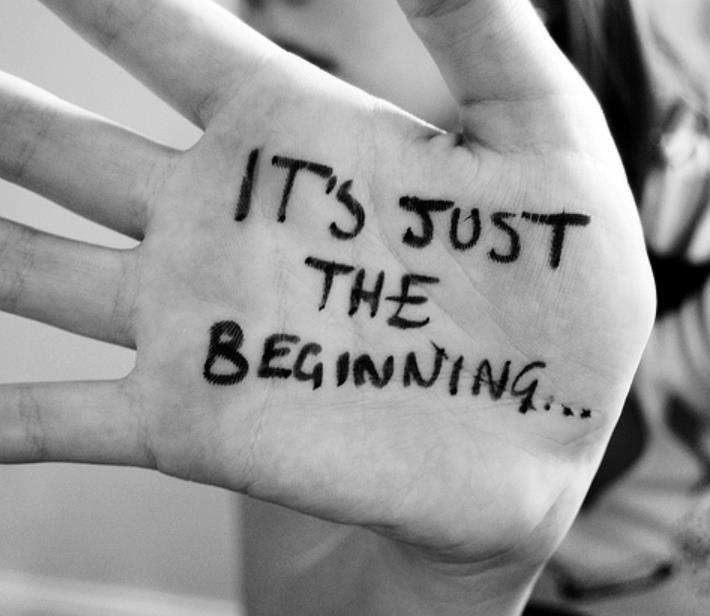
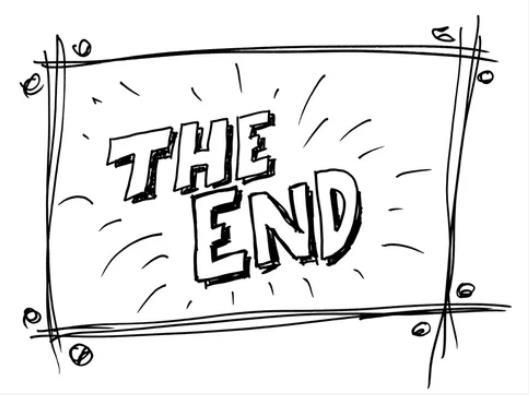
February 2023 - D6330 , 2020 Page 37 But no -












 By Ryan Hyland Produced by Andrew Chudzinski
By Ryan Hyland Produced by Andrew Chudzinski






 By Bryan Smith Photographs by Matt Stanley
By Bryan Smith Photographs by Matt Stanley


 ElsaMarie D’Silva, CEO, Red Dot Foundation
ElsaMarie D’Silva, CEO, Red Dot Foundation




































































